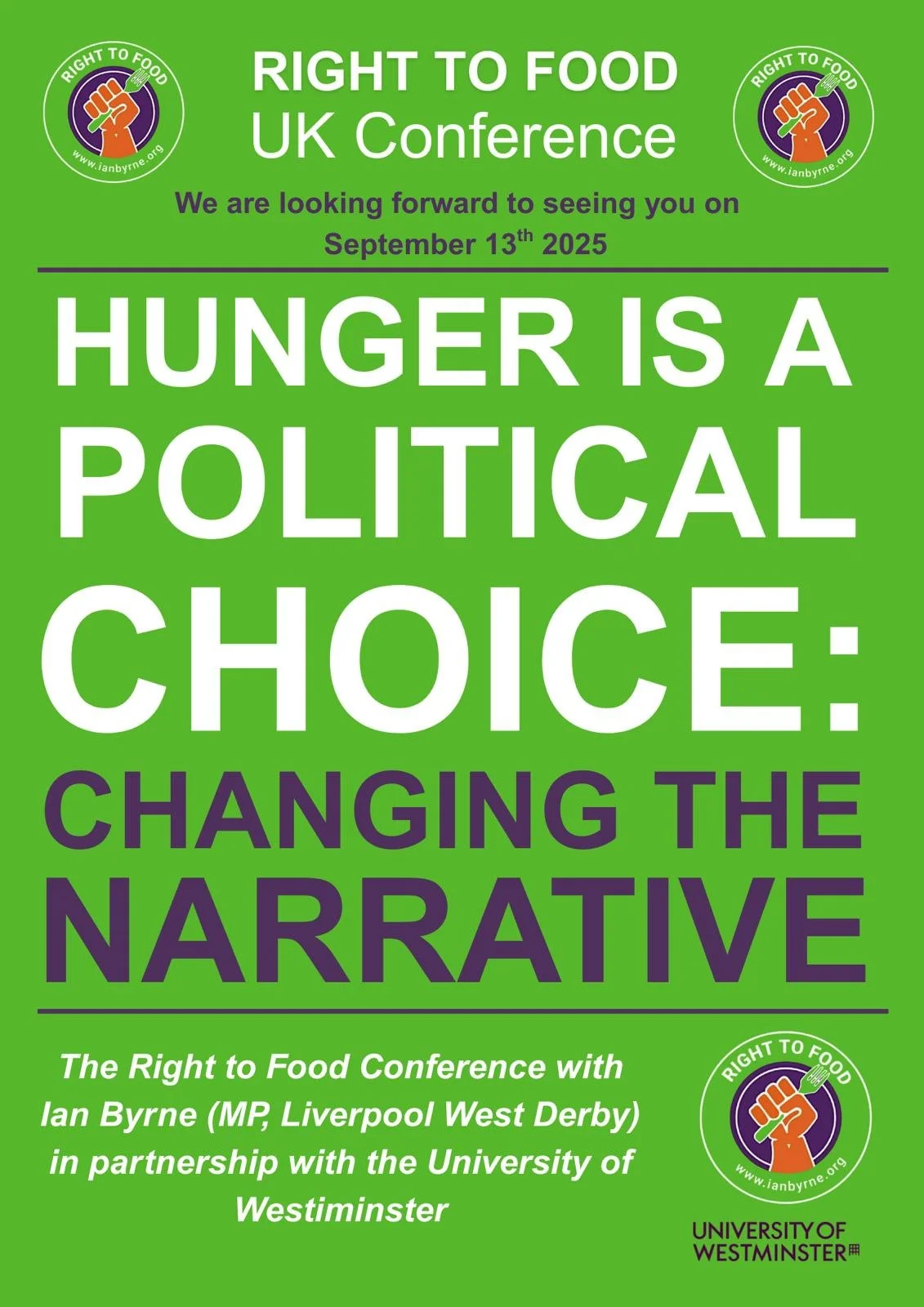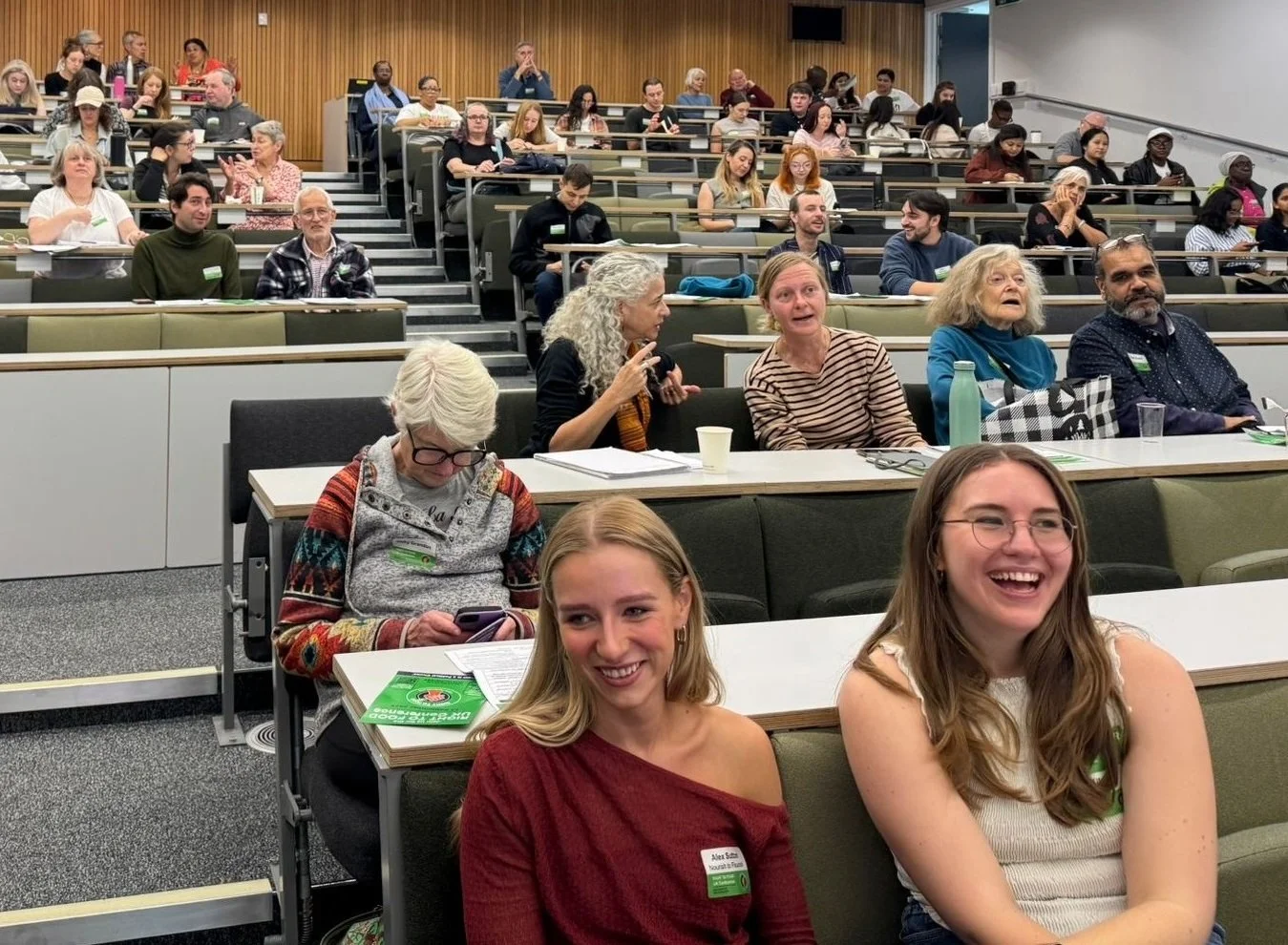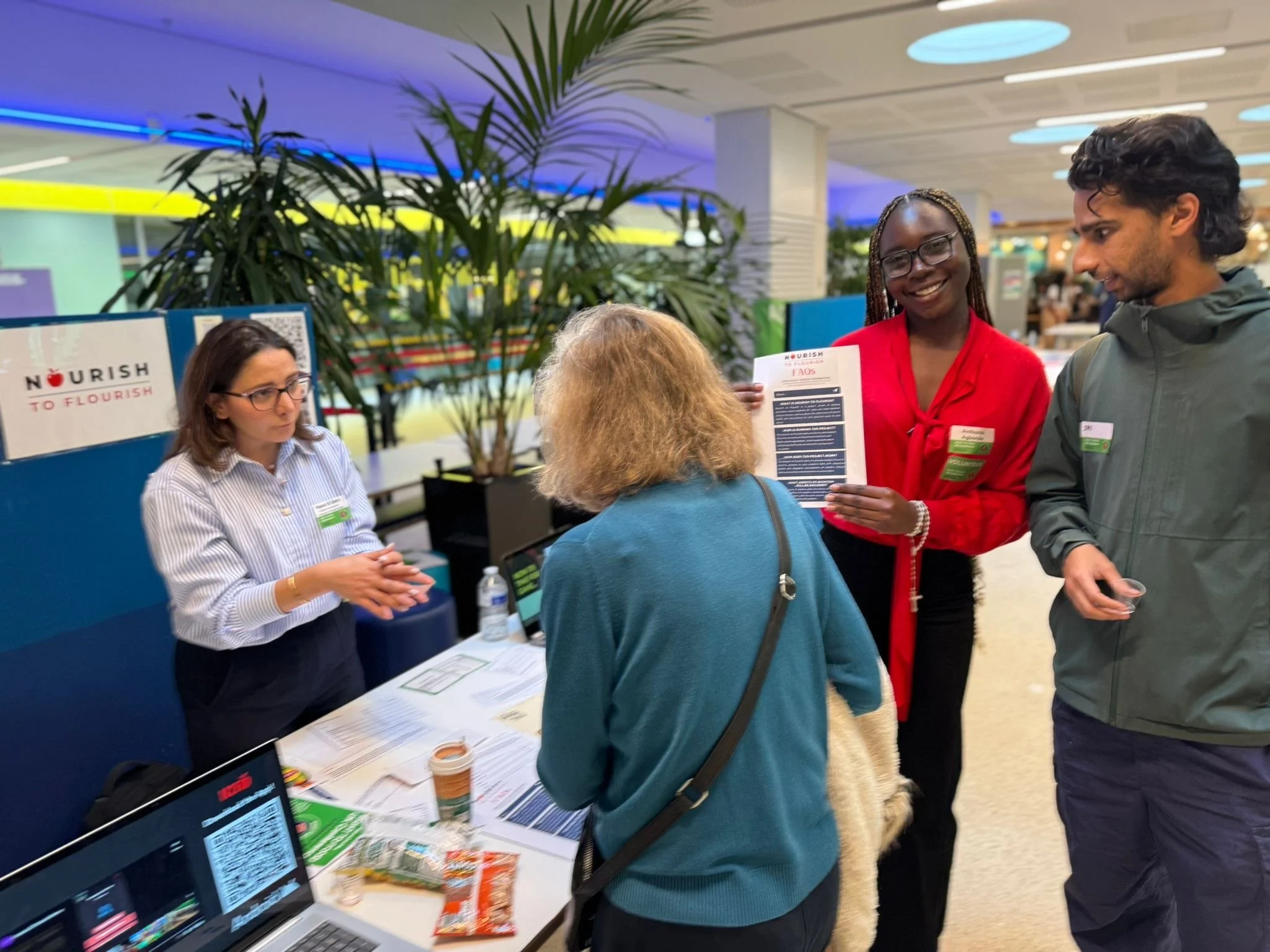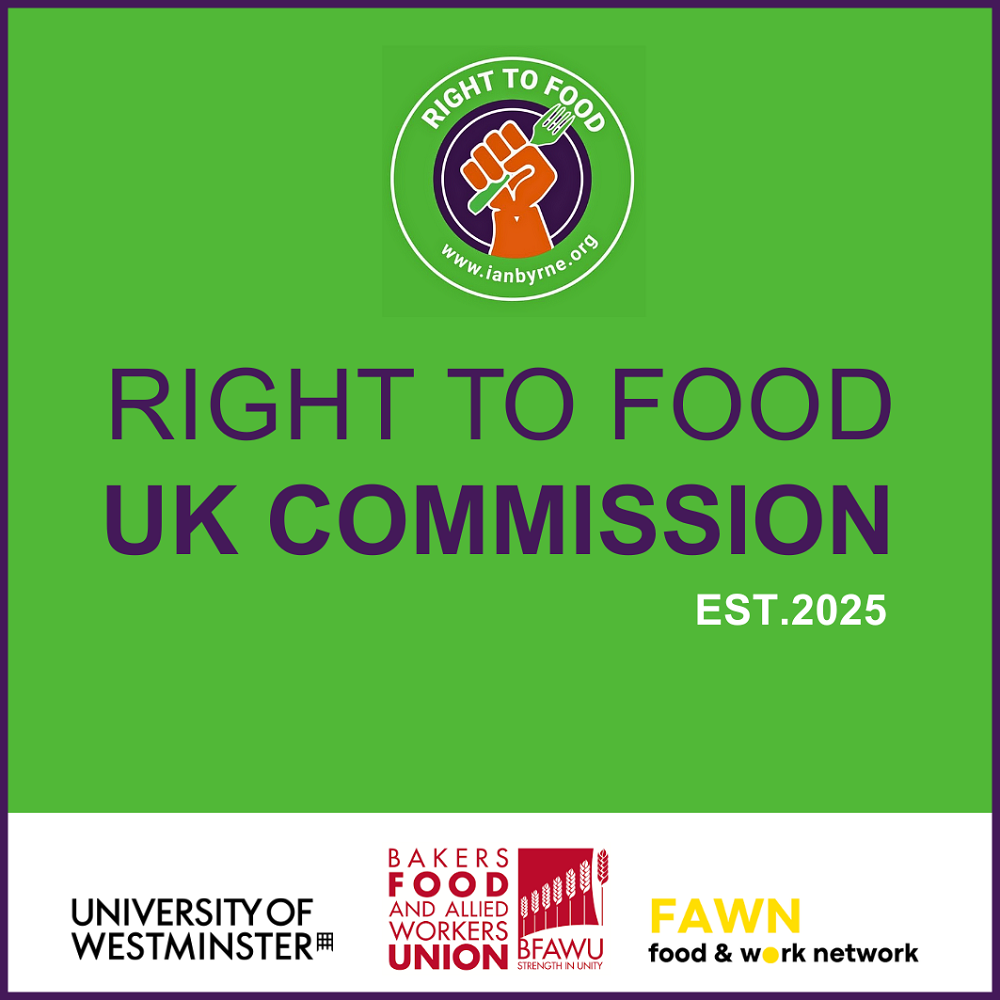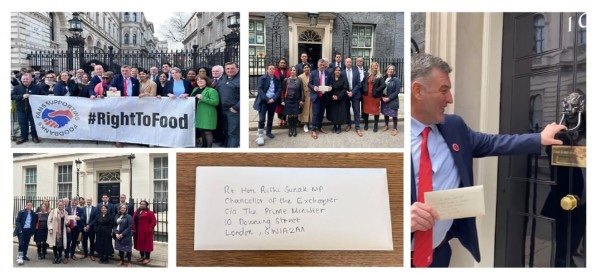
Right To Food Campaign.
The fight to make sure nobody goes hungry.
FOURTEEN million people in the UK are experiencing food insecurity.
Something must change.
I am the Parliamentary lead for The Right To Food Campaign. Our objective is to make access to food a legal right for all by having the Right to Food enshrined in law.
The Right To Food campaign comprises a wide range of national and local organisations and campaigners with a shared aim: to end the scandal of hunger and foodbanks once and for all.
Our Five Demands.
Hunger is a political choice and the Right To Food Campaign urges Government to deliver the following five core ‘asks’ and bring an end to end food poverty in the UK:
1. Universal free school meals. No child should go hungry and the Right To Food campaign is calling for free school meals for every child.
2. Government to state how much of minimum wages and benefits (on which people are expected to live) is for food. The Right To Food Campaign wants Government to reveal how much money is factored in for food when setting minimum/living wages and benefits.
3. Independent enforcement of legislation. Right To Food legislation must be accompanied by oversight and enforcement powers granted to a new independent regulatory body that will hold Government to account.
4. Community Kitchens. The Right To Food Campaign believes Community Kitchens provide a workable solution to food poverty. Government should fund dining clubs and ‘meals-on-wheels’ services for the elderly and vulnerable, school holiday meals for those most in need and cookery clubs for the wider community.
5. Ensured food security. Government must ensure food security and take this into account when setting competition, planning, transport, local government and all other policy.
“The problem of escalating food poverty in the UK can be fixed. There is a clear correlation between reduced government spending on welfare for families and the huge growth in foodbank usage.
“Like austerity, it is a political choice not a pre-determined occurrence. But it cannot be fixed without concerted effort by Government to take clear responsibility in developing solutions and policy to eradicate the problem at the root.”
— Ian Byrne MP
Why are we fighting for the Right To Food?
The number of British households in severe food insecurity is increasing.
Research by Trussell shows that 14.1 million people - including 3.8 million children - faced hunger in the UK in 2024 because they didn’t have enough money for food.
That’s one in six (16%) households in the UK going without enough food because they can’t afford it. This is up on 2022, when one in seven (14%) households, or 11.6 million people facing hunger in the UK.
“We know that food poverty leads to health and life expectancy inequality, malnutrition, obesity and a host of other related problems, including even long-term epigenetic changes. It will affect children’s educational attainment and life chances.
“Less measurable but no less important, is the effect on individual human dignity and social cohesion over time in our polarised nations of food banks next to investment banks.”
— Ian Byrne MP
Right to Food UK Conference
University of Westminster, London
Saturday 13th September 2025
On 13 September 2025 the Right to Food Campaign in partnership with the University of Westminster, held the inaugural Right to Food UK Conference to address the UK’s deepening food insecurity crisis and its devastating impact on health.
As keynote speaker I introduced the five pillars of the Right to Food Campaign and reminded attendees that ‘Hunger is a political choice’, urging all present to work for change and for communities to come together to hold Government to account for the Right to Food.
Conference found that alongside our campaign’s five core demands, collective action is vital; we can write to our MPs, build grassroots Right to Food groups, towns and cities, and take visible actions, including hunger marches, to ensure government listens.
We agreed that NHS strategies must put communities and nutrition at their core and examined the success of London’s free school meals programme - with obesity levels falling and student engagement, learning and attention improving.
Conference determined that local governments need resources to support community food provisioning including community kitchens, meals-on-wheels and food-growing programmes that strengthen nutrition, health and wellbeing; and that access to public health nutrition services must not be determined by postcode.
We also considered that community health nutritionists could provide vital bridges between schools, clinics and local communities whilst creating jobs for young people.
A combined approach is needed to put food security at the centre of health, nutrition and food systems, shifting power from food industries to community-led food systems.
Strong food standards, backed by an independent enforcement body with legal powers, are essential to hold government to account and to build sustainable local food systems that provide nutritious, culturally appropriate food and deliver food justice for all.
Right To Food UK Commission is announced at Right To Food Conference
The Right To Food UK Conference also marked the public announcement of a UK Right to Food Commission, which will collect evidence on what is causing food poverty in the UK, what is working to improve public health and nutrition in UK and will set out a roadmap for delivery of the five core asks of the UK Right To Food Campaign.
Commission Chair, Professor Barrie Margetts, said: “Food security isn’t just about availability, it’s about affordability, accessibility and time. The food exists, but it’s priced out of reach for so many now. The global food system makes unhealthy food cheap and nutritious food expensive, while wages stagnate and rents soar.
The Commission will explore these issues, as well as many more, and develop practical plans to deliver the campaign’s five key demands.
Learn more about the Right To Food Commission and follow its progress here.
In recognition of the impact on children, 1250 UK healthcare professionals signed a statement from Dr Ian Sinha, Consultant Respiratory Pediatrician at Liverpool’s Alder Hey Children’s Hospital and Professor in Child Health, to call out the unacceptable crisis of food poverty and supporting the enshrining of the Right To Food into UK law.
Hunger Is A Political Choice
“If one household in seven is food insecure, society is failing in a fundamental way. These figures on food insecurity are all the more chilling because the problem is solvable, but far from being solved, it is getting worse.”
- Michael Marmot, Director of the UCL Institute of Health Equity
The Right To Food Campaign agrees with Mr Marmot that the problem is solvable; indeed, we believe the hunger crisis in the UK is entirely down to political choices made by successive Governments.
So we are calling on the Government to do what its predecessors would not: namely, to call time on food poverty here in the world’s fifth wealthiest nation.
The Devastating Impact of Hunger On Our Children
Analysis by the Food Foundation in May 2022 found that food insecurity is more common among households with children.
More than 20% have faced moderate or severe food insecurity in the past six months, whilst in the year before the pandemic it was 11.5%.
Child poverty has not improved for decades, with one in three children living below the poverty line and missing out on normal activities such as having a birthday party, new stationary for their studies or participating in school trips. Before the pandemic, 70% of these youngsters had at least one parent in work.
In recognition of the impact on children, 1250 UK healthcare professionals have signed a statement from Dr Ian Sinha, Consultant Respiratory Pediatrician at Alder Hey Children’s Hospital and Professor in Child Health, to call out the unacceptable crisis of food poverty and supporting the enshrining of the Right To Food into UK law.
Food poverty leads to health and life expectancy inequality, malnutrition, obesity and a host of other related problems, including even long-term epigenetic changes. It affects children’s educational attainment and life chances.
Foodbanks are reporting that energy costs are so prohibitive for some people that they request charity food parcels without food that has to be cooked using a cooker or that needs to be stored in a fridge or freezer.
Foodbanks: Requests For Food That Does Not Require A Cooker, Fridge Or Freezer
The rapid deterioration in food security reflects soaring energy, food and petrol prices coupled with below-inflation benefit rises.
The Food Foundation said it was so shocked by the initial findings of its May 2022 survey that it reran the survey on a wider basis, only to get the same results.
Foodbanks are reporting that energy costs are so prohibitive for some people that they request charity food parcels without food that has to be cooked using a cooker or that needs to be stored in a fridge or freezer.
On 20 January 2021 Liverpool became the first ‘Right to Food City’ in the UK. Right to Food cities and towns now include: Liverpool, Liverpool Combined Authority, Manchester, Greater Manchester Combined Authority, Rotherham, Brighton and Hove, St Helens, Preston, Lancaster, Durham, Newcastle, Portsmouth, Totnes, Coventry, Sheffield, Birmingham, Haringey, Brent, Lewisham, Lambeth, Hackney, Southwark, Islington, Cumberland and Southampton.
#RightToFood campaign - key milestones
November 2020- January 2021
I launched the Right To Food campaign in November 2020 with the Fans Supporting Foodbanks national network.
On 20 January 2021 Liverpool became the first ‘Right to Food City’ in the UK when the city council unanimously called for the Right to Food to be incorporated into the National Food Strategy, an independent review commissioned by Government into the UK’s food system. Further endorsements from across Liverpool followed including from Liverpool FC, Everton FC, faith leaders, businesses, charities and members of the public.
Right to Food cities and towns now include: Liverpool, Liverpool Combined Authority, Manchester, Greater Manchester Combined Authority, Rotherham, Brighton and Hove, St Helens, Preston, Lancaster, Durham, Newcastle, Portsmouth, Totnes, Coventry, Sheffield, Birmingham, Haringey, Brent, Lewisham, Lambeth, Hackney, Southwark, Islington, Cumberland and Southampton.
March 2021-July 2021
A range of religious bodies, trade unions and campaign groups also wrote to Henry Dimbleby, Chair of the National Food Strategy, asking for Right To Food legislation to be recommended in its report to Government.
In March 2021 our campaign team made its submission to the National Food Strategy including five key ‘asks’ which we believe, if adopted by Government, provide an achievable, tangible and legally binding route out of food poverty for millions. These are: universal free school meals; community kitchens; reasonable portions in benefits and wages; ensured food security and independent enforcement.
Read the full submission: ianbyrne.org/right-to-food
Following publication of the National Food Strategy in July 2021, the campaign was disappointed that Right to Food legislation was not among its recommendations. We also wanted the then Government to provide for the Right to Food in its White Paper response to the National Food Strategy in 2022, but this sadly did not happen.
February 2022
Opposition Day Debate on Cost of Living and Food Insecurity
On 8th February 2022 during the Opposition Day Debate on Cost of Living and Food Insecurity, I spoke about the urgent need for Right To Food legislation
March 2022
The Right To Food campaign writes and delivers an Open Letter to Chancellor Rishi Sunak.
In March 2022 the Right To Food campaign called directly on the then Chancellor, Rishi Sunak, to deliver a Right To Food in his Spring Statement on 23 March 2022. Hunger Is A Political Choice - and we asked Sunak to make the right ‘CHOICE’ to end food poverty, by making provision for our five key campaign asks.
September-October 2022
The Right To Food Campaign called directly on then Prime Minister Liz Truss to deliver a Right To Food during her administration. I requested a meeting with her to discuss this further on behalf of the campaign.
I also extended an invitation to the Prime Minister to visit Liverpool in October to experience a Community Kitchen in my West Derby constituency. Community Kitchens are one of our campaign’s five demands and we ran a very successful pilot here in October 2022.
Community Kitchen Pilot, Liverpool West Derby
In October 2022 the Right To Food campaign ran a Community Kitchen pilot scheme at St Cecilia’s School in Croxteth in my Liverpool West Derby constituency.
The Community Kitchen model is one of five demands of our Right To Food campaign.
Our ‘Scouse Kitchen’ pilot was a much-needed intervention for many in West Derby. I regularly hear from mums, dads and carers in my constituency who cannot afford to put food on their family’s table.
The spectre of hunger and the need for a Right To Food is very real right here in West Derby, where a recent Survation poll found that 73% of my constituents fear being unable to afford their energy bills next year; 37% fear homelessness within a year and 41% fear they will be using foodbanks inside a year.
The pilot ran for one week and saw the canteen at St Cecilia's School transformed into a restaurant in the early evening, where families could book a table to eat a freshly cooked and nutritious meal together in a dignified setting for free.
The Scouse Kitchen was open to St Cecilia's pupils and families throughout its duration. It is hoped the Community Kitchen will be opened up to the wider community on a more permanent basis soon.
January 2023
In January 2023 I extended an open invitation to the then Prime Minister Rishi Sunak to meet me to discuss the need for Universal Free School Meals and the Right To Food campaign as a whole.
On 11th January 2023 I told Parliament how our Right To Food campaign proposals would see every state school pupil given a free breakfast and lunch, to support all children reaching their potential.
As I told the House, this investment would pay for itself and more: over 20 years it would generate £100 billion for Government through savings in health, education and improved lifetime earnings.
Universal Free School Meals are an investment that transforms the futures of children across the UK and, as I told Parliament, it’s a no-brainer, no matter which side of the political divide you are on.
Universal Free School Meals are one of the 5 demands of our Right To Food campaign.
February 2023
Free school meals for all primary pupils in London
In February 2023 Mayor of London Sadiq Khan announced emergency measures to extend Free School Meals to all primary school children in the capital. Universal Free School meals are a game-changer on so many levels and the Right To Food campaign wants to see this rolled out across the UK.
The Right To Food campaign views this as a hugely positive political choice by the Mayor and one that will transform the lives of children and families in London. Well done to our Right To Food London campaigners for their fantastic efforts toward securing Universal Free School Meals as part of our national campaign. Universality is a policy whose time has come and it is one of the five key tenets of this campaign.
March 2023
Westminster Hall debate on Poverty: Food Costs
On 1st March 2023 I spoke in a debate in Parliament regarding the cost of food.
You can watch a clip of the speech I made during this debate on the YouTube video on this page, and/or read the text of the speech below:
“I want to make it clear at the outset that the catastrophe of hunger and poverty in our communities is the result of political choices made by this Government. If a Government cannot ensure that everyone has enough to eat-and not just to eat, but to thrive-they are a Government that is fundamentally broken. The time for sticking plasters is surely over. We need to legislate for a right to food and enforceable food rights, and to ensure that the Government of today are held accountable for the cost of food and ensuring nobody goes hungry.
I pay credit to Mayor Sadiq Khan. I am so happy that he is sorting out universal free school meals and introducing them in London for all primary school children, which is an essential part of the right to food. It is a fantastic move forwards, but it is clear that our communities are in crisis at the moment. I pay tribute to all the workers taking industrial action in defence of their communities, including the teaching staff in West Derby, who were out on the picket line yesterday. The 17% rise in the price of food is the biggest rise since 1977 and comes alongside the sharpest fall in wages since 1977. Food inflation up, wages down-do the maths.
It is really important to look across the piece at how people are being demonised. The demonisation of those in food poverty is an act of political cowardice by an Administration bereft of ideas to solve the problem, and lacking humanity toward the millions who are suffering and looking to the Government to lift them up and not punch them down. If reliance on charity alone was considered a sufficient guarantee for basic human needs in the UK, previous generations would not have legislated for universal state schooling and a national health service. The current horrific situation demonstrates that we need the same vision and ambition when it comes to food security. It cannot wait a moment longer.”
August 2023 - Update on the Right To Food Campaign
I am delighted to say that the campaign has gone from strength to strength. Collaboration with councils, trade unions, football clubs, faith leaders, community groups, health workers, local businesses, politicians, and many more, has grown the campaign and built pressure on the Government through our collective action and solidarity:
17 Right to Food cities and towns: Since Liverpool became the first ‘Right to Food City’ in the UK in 2021, there are now 17 areas signed up, and millions of people who can say they live in a Right to Food city. Right to Food cities and towns now include: Manchester, Greater Manchester Combined Authority, Liverpool, Liverpool Combined Authority, Rotherham, Brighton and Hove, Haringey, St Helens, Preston, Lancaster, Durham, Newcastle, Portsmouth, Totnes, Coventry, Sheffield, Birmingham.
53,000 people: signed a petition to Parliament demanding a Right to Food in UK law
59 MPs: signed a Motion in Parliament calling for a Right to Food
The Trades Union Congress, which represents more than 5.5 million workers, passed a motion supporting our calls for a Right to Food
Downing Street: campaigners from across the country came to Downing Street to hand in our open letter demanding a Right to Food and our key campaign requests, including Universal Free School Meals.
September 2023:
Right To Food Week 2023
Right To Food Week 2023 took place 18th-23rd September, bringing people together to ensure our collective demand for the Right To Food is heard.
As the Parliamentary lead for the Right To Food Campaign, I am delighted that our national week of action was a success, bringing together many people and organisations in our communities to increase awareness of the urgent need for a legal Right To Food.
How YOU can join the Right To Food campaign.
There are various ways you can be part of the campaign:
1. Get a Right To Food Campaign Toolkit
You can download our Right To Food Campaign toolkit comprising:
a) A Model Motion on supporting the Right To Food for councillors to put through town/city councils or for members to adapt to put through local trade union or Labour Party branches.
b) A Right To Food Campaign leaflet setting out the main purpose of the campaign and our five demands. You can print and/or share this to help gain buy-in for the campaign.
c) A set of Right To Food Campaign social media graphics to show your support for the campaign and to help direct more people to the toolkit.
Click here to access and download the Right To Food Campaign toolkit materials
You can also contact ian.byrne.mp@parliament.uk to receive a Right to Food campaign toolkit and to get advice on how to start a Right To Food initiative in your area.
2. Support the #RightToFood Campaign on social media
Follow @IanByrneMP and @SFoodbanks on Twitter and share #RightToFood content.
Feel free to use and share our campaign graphics.
3. Join Grow West Derby
If you are a West Derby constituent, you can get involved in the Grow West Derby initiative by registering on this page: Grow West Derby


